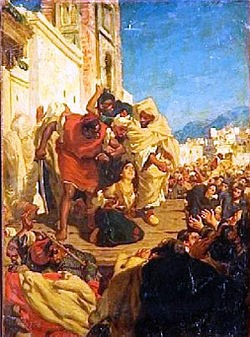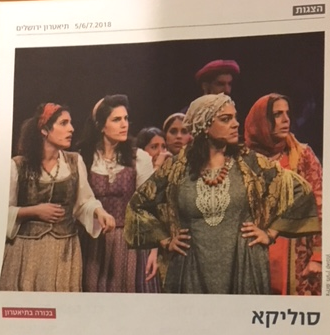“Solika”
A Play Performed at the Jerusalem Theater
by the Beersheva Theater
Company
August, 2018
Reviewed by Judith Roumani

Execution of a Moroccan Jewess
Sol Hachuel
a painting by
Alfred Dehodencq
Sol Hachuel (1817, Tangier–1834, Fez) was a Jewish heroine who was arrested by the pasha and executed by the sultan of Morocco in 1834. Her crime was that she refused to abjure her Jewish faith. Her Muslim friend and neighbor claimed that she had actually converted to Islam, the sultan’s son was said to be in love with her, and since she was of extraordinary beauty, it was also said that Muslims in Morocco believed that such beauty had to belong to one of their own faith.1 She had been educated in the Jewish religion by her own father, and it does not seem likely that she would have converted to Islam, although there are many different versions of the story. The pasha, incensed at her insult to Islam, threw her into prison in chains, then sent her at the Jews’ expense to the sultan for judgement. Though her story was already celebrated in the nineteenth century in novels in Spanish and French, it seems that the basic story outline is true to history.
Still resisting conversion, and the opportunity to marry the prince, Solika (whose name has many different spellings) was eventually executed publicly, the executioner merely wounding her with the first cut, to give her a chance to change her mind, which she did not. After her death, she was immediately revered as a saint by Jews, and even by Muslims, becoming ‘Solika la Tzadika’, one of the Moroccan Jewish saints who are honored across the Sephardic world on Lag b’Omer. Her tomb is a place of pilgrimage for Jews and Muslims even today.

The play, based on the novels, and emphasizing the romantic side of the story, is a musical/operetta, listed as one of the best plays of the year performed in Israel. Solika is played by the graceful and beautiful Reut Cami Alush. It played to full and standing room-only audiences and has great potential for an international audience as well, as it speaks about religious coexistence between Jews, Muslims and Christians and about loyalty to one’s identity.
The play was first performed in Beer Sheva in February 2018. As Ayelet Dekel2 writes, “The version chosen by Sabag and Sibony is one of forbidden love, and fidelity to one’s beliefs. Yet the emphasis of this production is on the relationships between Jews and Moslems as neighbors and friends; and the tragedy that can result when one allows the differences, rather than shared humanity, to determine choices. Although the story is a simple one, with an almost fairytale quality (albeit tragic), its message has a very contemporary feel. The story is told almost entirely in song – and the songs are wonderful, performed with a live orchestra onstage.”
Judith Roumani
Editor, Sephardic Horizons
1 For the historical background to this review see the research articles conducted by the extended family of Solika Hatchuel-Hatchwell, as well as the Wikipedia article under her name.
2 The play was first performed in Beer Sheva in February 2018. Ayelet Dekel’s review, quoted herein, may be found at Midnight East, an online magazine dedicated to adventures in the Israeli cultural scene. With thanks to Suzi Tourgeman.
Copyright by Sephardic Horizons, all rights reserved. ISSN Number 2158-1800
